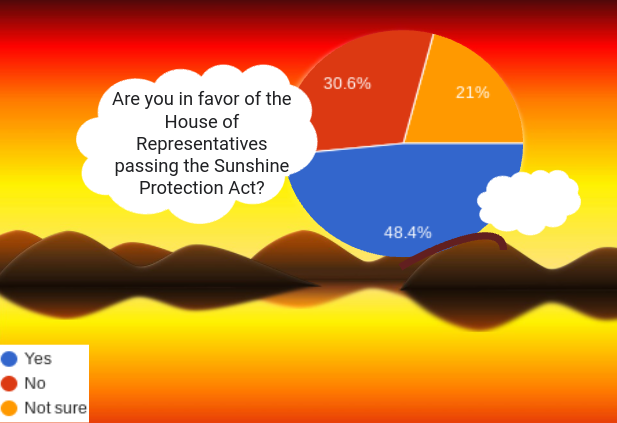Fabulous or frivolous: The Sunshine Protect Act
April 18, 2022
A recent survey conducted by The Page asked PA students to share their opinions on the Sunshine Protection Act passed by the US Senate in March. The following information was provided about the bill: “On March 8, the US Senate passed legislation that would make daylight saving time permanent beginning in 2023. This would bring a close to the twice-annual resetting of clocks; however, time would be ‘stuck’ in this sprung-forward state rather than having standard time all year round. Arizona and Hawaii do not observe daylight saving time meaning their clocks would be out of sync all year long. In addition, the ‘normal’ sunrise and sunset hours would remain for the spring and summer months, but under daylight savings time, in fall and winter, the sun will not rise until after 8 or even 9 a.m. in some areas of the country. While the Senate unanimously passed the Sunshine Protection Act, the House of Representatives has yet to pass the bill.”
Twenty-one percent of respondents are unsure about whether or not they support having daylight saving time year-round. This opinion is expressed by an anonymous comment that states: “I really hate daylight savings. When I think about daylight savings, I think ‘ew I hate that.’
“It is yet another reminder of the fact that the U.S. is weird, similar to our refusal to use the metric system. I think we should rid ourselves of daylight savings because it is literally pointless and brings me a great deal of sadness, as I am oh so sleepy because of it. BUT, it is also super weird that we won’t be in sync with the rest of the world. Why can’t we get rid of it and be in sync? Where is the logic?”
Other students are more sure about their thoughts on the matter, with 30.6 percent of the respondents not in favor of the bill being passed by the House of Representatives. Sophomore Katherine Haden, however, is in favor of making Standard Time permanent as it “aligns more with the sun, which dictates our biological clocks. Morning darkness in daylight savings time negatively impacts mood as well as health, making us feel constantly tired because we’re out of our natural rhythm.”
In general, a number of respondents believe that the bi-annual “changing [of] the clocks is outdated and no longer useful.” According to one anonymous response, “With electricity, we don’t really care about losing one hour of sunlight.”
This respondent is a part of the 48.4 percent of respondents that are in favor of the House of Representatives passing the bill.
However, others support the argument that the current system is beneficial for saving energy. According to sophomore Sam Dibelardino, “There are a lot of cost and energy saving arguments to be made in favor of shifting the clocks, as you will have less energy use for lights and some appliances, and in 1975 a study by the Department of Transportation showed it cut U.S. energy use by one percent per day; which is not a lot but it adds up. Plus there will be a mental side effect to leaving for work or school and not having the sun rise for another two to three hours. On the upside, clocks will be somewhat standardized, but I will be interested if this turns out to be worth it…All in all, it may be a mild annoyance and a bit hard to adjust to sometimes, but if it means we can cut down on our energy usage as a whole then it may be worth keeping daylight saving around.”






